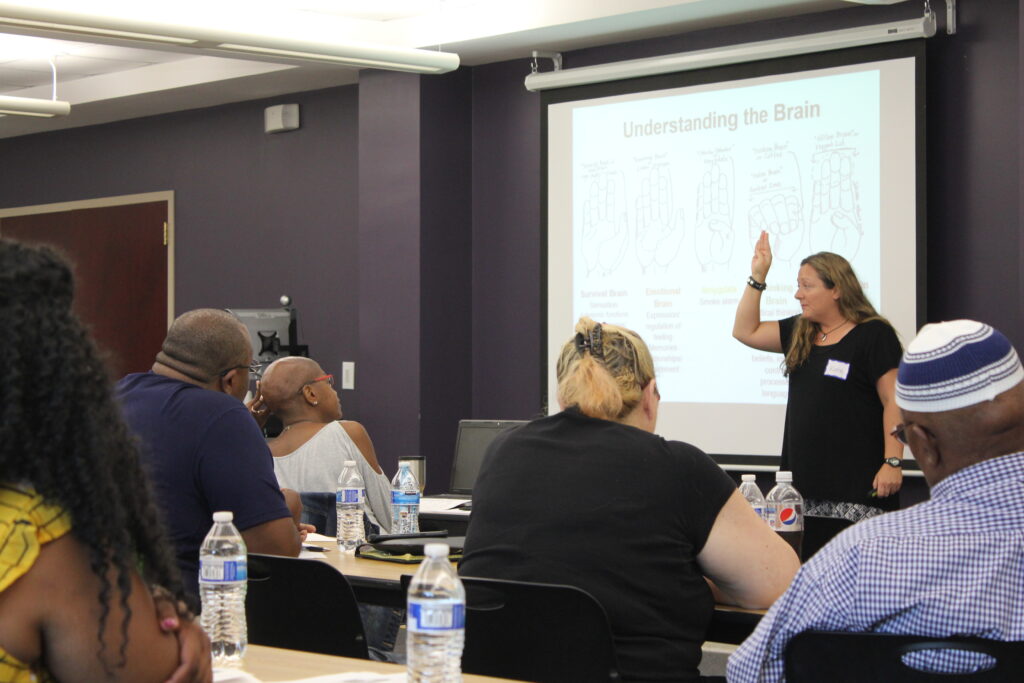Five Communities: Rural Opportunity Institute

For the upcoming ReCONNECT to Community forum, Nov. 27 in Asheville, the Institute for Emerging Issues has chosen five community initiatives from throughout North Carolina that will share with our forum audience how they’re working to increase civic engagement in their communities. Here, we profile the Rural Opportunity Institute, an Edgecombe County-based initiative, which works to build strategies and programs to support understanding and healing from trauma. The Institute was founded by two Teach for America alums.
Vichi Jagannathan couldn’t get eastern North Carolina out of her mind.
Long after she left Edgecombe County as a Teach for America recruit, she still thought about the high school students that she had taught—she still thought about their challenges, and she still thought about the way she saw the effects of long-buried trauma rippling through their lives.
That’s why after a detour in San Francisco working for a large software company, the native New Yorker returned to eastern North Carolina, and with fellow Teach for America alum Seth Saeugling, created the Rural Opportunity Institute, an eastern North Carolina-based nonprofit that brings together community members across sectors to identify and implement strategies and programs to support healing from trauma and building resilience.
The Rural Opportunity Institute is one of the five community initiatives whose innovative approaches to increasing civic engagement will be featured at the upcoming ReCONNECT to Community forum in Asheville.
“Trauma impacts everybody, it’s a baseline connection to community,” Jagannathan said recently from the campus of Edgecombe Community College where the Rural Opportunity Institute was presenting a free trauma training to leaders from throughout eastern North Carolina, thanks to the Institute’s partnerships with Resources for Resilience and DPI. The training looked at how to spot trauma, as well as how to help people, specifically children—as many in the crowd were educators—overcome its effects.

And by addressing trauma, other key conversations can be addressed, such as racism, poverty and lack of resources—all issues that are important in the vastness crucial issues in eastern North Carolina, Jagannathan said.
But there’s a lot of beauty, and history, in the eastern part of the state as well, part of why Saeugling also chose to come back to eastern North Carolina. “I love the people here, there’s such a deep connection to place,” he said.
Saeugling believes there’s such an openness to talking about trauma now, even in rural places like eastern North Carolina, because research like the ACES report have been circulating in the greater society for about 20 years.
Indeed, many in the crowd at the Edgecombe Community College training were very open with their personal stories of trauma as the Asheville-based instructors talked about trauma-related topics such as “Fight or Flight” syndrome, parental abuse and institutionalized trauma.

One woman in the crowd shared her experience of being shot. Another attendee shared her experiences dealing with drug-addicted teens. Others, like Na’im Akbar, discussed how recognizing the scars of trauma helped them understand issues they encounter at work— in Akbar’s case helping formerly incarcerated people re-enter society. “I have to help them deal with their traumas if they’re going to reintegrate into society,” Akbar said.
Kenny Parker also found the trauma training useful for his work. A native of Edgecombe County, he currently works with a minority male mentoring program with Edgecombe Community College. “We need to understand that children are the byproduct of their environment,” he said.
In the future, the Rural Opportunity Institute hopes to continue to expand access to trauma training and knowledge about trauma and resilience to more individuals across different sectors, and to begin piloting interventions that move communities away from punishment and towards restorative options that help people heal from trauma and re-integrate into society, Jagannathan said.
If you’re interested in learning more about what the Rural Opportunity Institute does, visit ruralopportunity.org.
Join IEI on Nov. 27 in Asheville during our ReCONNECT to Community Forum to hear first hand how the Rural Opportunity Institute and other communities are working to strengthen North Carolina. For more information, or to register, visit emergingissues.org.
- Categories:


